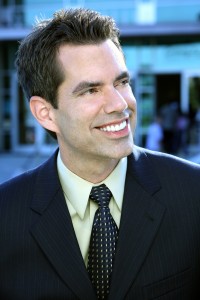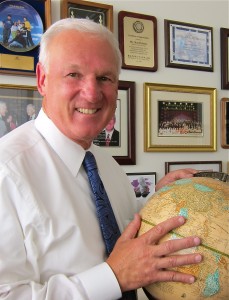Daily Business Report — Election Preview
Q&A With 4th District Supervisor Candidates


Ron Roberts and Stephen Whitburn are the major candidates competing for the county’s 4th Supervisorial District in the Nov. 2 general election. Roberts, the incumbent, has been on the Board of Supervisors since 1994 and previously served two terms on the San Diego City Council. Whitburn, community health educator for the American Red Cross, has served three terms as president of the San Diego Democratic Club and is a board member of the American Civil Liberties Union of San Diego and Imperial Counties. Although board seats are non-partisan, Roberts is a Republican and Whitburn is a Democrat.
The candidates responded to a questionnaire from San Diego Metropolitan Magazine:
1. What is your position on Proposition A, the measure that would ban Project Labor Agreements on county construction projects?
ROBERTS: Proposition A ensures continued fair competition to build public works projects in the county, protecting your tax dollars. Prop A will prevent unions from imposing sweetheart agreements that require taxpayers to pay inflated union wages and to turn control of the hiring over to union bosses. Nearing completion right now is the County Operations Center that I fought to fund in Kearny Mesa. This project has provided hundreds of jobs, many to union members whose employers have won those contracts in an open competition on an even playing field. These projects are coming in on time and likely under budget.
WHITBURN: Proposition A reflects existing county policy and does nothing new, yet it was put on the ballot by the Board of Supervisors at a $100,000 cost to taxpayers. The measure does not prohibit a private party from entering into a PLA but rather restricts any mandate to do so by the Board of Supervisors.
2. Should the Neighborhood Reinvestment Program be eliminated or retained, and why?
ROBERTS: I strongly support this program. Grass-root neighborhood and community-based organizations are our most effective partners in cost-effectively delivering services to people and programs who make a difference. We have partnered in creating a food pantry and foster school and provided funding for state-of-the-art medical clinics and farmers’ markets. This program is completely transparent, with all discussions and decisions made in public by the full Board of Supervisors. If this program is eliminated, funds now effectively combined in partnership with these organizations will simply be absorbed into the bureaucracy.
WHITBURN: A number of the organizations that are funded through this program are worthy organizations and deserve county support. However, the supervisors have turned the Neighborhood Reinvestment grants into political slush funds. Taxpayers deserve a process that gives them a voice in discretionary spending and doesn’t allow elected officials to play politics with our tax money for their own gain. Ron Roberts has given $850,000 of our tax money to a China trade lobbyist group, which in turn has sent him on six all-expense paid junkets to China. A fair, transparent, and inclusive process could include a citizens’ commission to make grant-funding recommendations to the supervisors.
3. Homelessness seems to be on the rise. What can the county do to address this issue?
ROBERTS: The county of San Diego invests more than $50 million annually on services for homeless individuals throughout our region. The city of San Diego receives its own state and federal funds for homeless shelters and low-income housing which is administered through the San Diego Housing Commission and whose jurisdiction overlaps my Fourth Supervisorial District. The county also†provides health professionals and case managers each year at the City’s downtown winter shelter to connect eligible people with services, assists them with accessing them and funds a fulltime social worker as part of the Homeless Outreach Team which is a partnership with the San Diego Police Department.
WHITBURN: The county, city and state should be working in tandem to address homelessness. The devastating economic environment has exacerbated the problem. First and foremost, we have to redouble our efforts to create jobs. Ron Roberts and his fellow supervisors failed to apply for more than $10 million in federal funding that would have gone to local businesses to hire people who are unemployed. This was a huge mistake and they should be held accountable. Those monies could have created thousands of jobs for San Diegans and gotten people off the streets.
4. With fire season now here, what can the county do today, and what should it plan to do tomorrow?
ROBERTS: Fire and rescue services are a top priority of the county of San Diego. Separate from law enforcement, we have spent more than $200 million on this since 2003. The San Diego County Fire Authority trains, certifies and pays firefighters in districts throughout our region. We have added in the last decade, at my urging, two county-owned firefighting helicopters and adopted construction standards that parallel the strictest in the world. Our investments and partnerships to bring planes like the SuperScoopers and helicopters like SDG&E’s new Helitanker into the fray have helped effectively fight fires and, in recent years, we have acquired 34 firefighting apparatus. We have successfully convinced a reluctant state of California to allow our military to use its aerial firefighting equipment on fires in our county. Do we need a separate fire district like found in the county of Los Angeles? Probably eventually. The fire district in L.A. is primarily funded through a $58 assessment charged each year for every residential unit and an additional .17 percent from the annual property tax payments. In 2008, in cooperation with San Diego Mayor Jerry Sanders, I put a similar measure on the ballot and it garnered 63.6 percent of the vote. It needed two-thirds of the vote to pass. Had it been approved, the city of San Diego’s fire department would have received more than $20 million in new funds by now and what would have been our regional fire authority $50 million. We will eventually get such a district. However, in the meantime we have been, and are continuing to, make significant investments and improvements to our region’s firefighting capabilities.
WHITBURN: A county fire department is necessary. Our current supervisors never seemed to learn from the devastating 2003 and 2007 wildfires that we need a real fire plan and we need it right away. As The San Diego Union-Tribune pointed out in a recent editorial, it’s time for a “kick in the pants” after seven years and little to no action or funding. We need new leadership to get the job done. It is unacceptable that more people have burned to death in wildfires in San Diego County over the past decade than anywhere else in the nation while the county is sitting on $700 million in reserves. The existing fire districts must be included in the process from the beginning to earn their confidence. New leadership and accountability can make change happen. My candidacy has finally spurred some action on this issue – imagine what we can do when we have a voice on the board?
5. Does the county have a role in the city’s discussion with the Chargers?
ROBERTS: Yes, the county of San Diego should participate under the right circumstances. About a year ago, a discussion began about the possibility of the county participating in an expansion of the Downtown redevelopment effort east of Petco Park. Supervisor (Dianne) Jacob and I are part of that discussion. If a mechanism can be created that will generate increased tax revenues for the county of San Diego without additional risk to county taxpayers, then I would support participation.
WHITBURN: We all love the Bolts, but we also remember the horrible effect of the Chargers ticket guarantee and the millions of dollars that cost us. We must be very careful in how we use taxpayer money and not get ourselves into a similar situation when it comes to paying for a new stadium.
6. What can the county do to help continue the revitalization of the business districts in North Park, South Park and Adams Avenue?
ROBERTS: My office has worked closely with the boards of the Adams Avenue Business Association and North Park Main Street on numerous projects, ranging from banners that promote events to help with festivals, farmers markets, graffiti removal and funding of the Toyland Parade. Through my recommendation, the county provided significant funding for the design and construction drawings for the North Park Theatre Promenade. I also made the recommendation that the county provide the funding for the restoration of the Kensington sign, scheduled to be reinstalled later this year. I remain actively involved with those organizations and efforts that promote local commerce and livable communities.
WHITBURN: If the federal government renews its stimulus funding to create jobs, I’ll make sure the county applies for its share of the money next time. The Board of Supervisors missed a crucial opportunity to create jobs, increase discretionary spending and improve our local economy when it failed to apply for the federal stimulus money. Many of our small businesses are dependent on neighborhood residents having discretionary income, but without jobs, people have much less money to spend at these businesses.
7. The greater North Park community has seen a growing number of medical marijuana dispensaries. Why are they not regulated and is this something the county can address?
ROBERTS: Because these dispensaries are within the city of San Diego’s jurisdiction, the Board of Supervisors has no regulatory authority over them. Certainly, the city of San Diego has been very slow in clarifying the rules under which the medical marijuana dispensaries may operate. I support development of such an ordinance that allows legitimate dispensaries to operate, but I’m concerned by positions my opponent has taken that would allow such facilities to locate in the vicinity of parks, churches and other inappropriate locations.
WHITBURN: The city of San Diego is expected to adopt regulations for medical marijuana dispensaries in the coming months.
8. How can the county address the high unemployment rate?
ROBERTS: Fortunately, because of our strong fiscal position, the county of San Diego has been able to put in place millions of dollars of job-creating construction projects. We are paying for much of this work with cash, and thereby avoiding burdening future generations with financing costs. I am most proud of the $500 million County Administration Center complex. It has created more than 1,000 good-paying construction jobs. This will continue, and when completed, these projects will have put thousands of San Diegans to work in similar capital improvement projects that address our next 30 years of building infrastructure needs and leave behind virtually no debt for future generations. This past summer, I worked with the San Diego Workforce Partnership to find funding that put nearly 1,600 teenagers to work. We did this by carefully finding county dollars and grants that were appropriate for the effort and would not come back to haunt us with federal and state collection efforts later. At my urging, we also dropped the permitting fee for home solar installations and reduced fees for companies testing out sites for alternative energy projects. I also worked with the county treasurer on a policy that allows for over $100 million to be safely deposited in fully-insured local banks and available for lending to local businesses instead of depositing it in out-of-town institutions that don’t have a similar local impact. The most important thing we can do is avoid the temptation to put more fees and regulations on the very local businesses we need to provide the jobs that will slowly lead us to better times.
WHITBURN: The board should be doing everything it can to create jobs and get people off of welfare. Numerous media outlets have reported that Ron Roberts and the board failed to apply for more than $10 million in federal funding that would have gone to local businesses to hire people who are unemployed. This money would have helped the businesses, created thousands of jobs and given our local economy an important jolt. It was reported that the program added more than 20,000 jobs in California, but none in San Diego because the board failed to apply for the money.
9. According to KPBS, a review of Board of Supervisors policy shows that its official position supports amending the U.S. Constitution to deny citizenship to children born in the U.S. to illegal immigrants. Are you familiar with that policy? Do you support it?
ROBERTS: I personally oppose this provision. The county’s legislative policy regarding citizenship was in place before I was elected. I’ve voted to approve amendments to the policy related to then-pending legislation, always with the goal of seeking to recover from the federal and state governments the cost borne by local taxpayers for the failure of the federal government to address this issue.
WHITBURN: I am familiar with this policy, which Ron Roberts and the other supervisors have repeatedly approved by unanimous votes. Roberts has since said he didn’t understand what he was voting on. I am opposed to this policy. America has a long tradition of welcoming as a citizen anyone born on our soil.
10. The North Park Family Health Center serves as a clinic for many area residents who lack health care coverage. Is that the right model for our county to follow or should we fund a county hospital system like Los Angeles County does?
ROBERTS: In an era of decreasing government revenue, it would be foolish to attempt to recreate thepublic hospital systemthat the county of San Diegoabandoned in the 1970s. One need only look north to Los Angeles where more than a billion dollars is being poured into a County Hospital system where emergency room wait times have been measured in days. With partners like North Park Family Health Centers and La Maestra, two of our robust community health clinics, we have created a health care network in our working communities that is held as a model. The pioneering Safety Net†Study that Supervisor Cox and I had prepared gives us a roadmap on how we can improve the system based on strengths and weaknesses identified with stakeholders (hospitals, community clinics, doctors, health plans). The Board allocated $5 million to follow the report’s findings and recommendations, all of which are in full implementation phase. Several of these best practices put our county ahead of the game as we prepare to comply with new federal healthcare reform including electronic medical records.Public health andsafety remain the top priority of the county, and our professionals work closely with the region’s medical community, while committing resources to preparing for, and responding to, threats such as H1N1 andwhooping cough.
WHITBURN: The county charter states that it has a responsibility to provide health services, and some advocates have called on the county to resume this function more directly. However, the idea has not been studied recently. It is always reasonable to study whether we are providing health care in the most effective manner. I understand that other counties around the state are also revisiting this issue.
11. Briefly state your primary reason for running?
ROBERTS: As the state of California suffers an unprecedented fiscal meltdown, the county of San Diego faces perilous fiscal times, the worst I have experienced since joining the county at a time when it was teetering on the edge of bankruptcy. Through smart and creative leadership, we earned the highest financial rating of any county in California. While those reforms have us well prepared to endure the fiscal calamity greeting governments that surround us both big and small, it will take experience and creativity to ride out this latest storm while continuing to deliver our residents the services they need and deserve without adding huge new taxes. I also expect to lead the county forward on construction of a waterfront park that will be enjoyed by generations and continue to help advancing the causes of alternative fuels and clean air through my positions on the local and state air boards.
WHITBURN: I am running because our 16-year incumbent, Ron Roberts, has failed our communities and we need a change in leadership. Instead of creating jobs and working to protect our families, Roberts has taken actions that have cost San Diegans good paying jobs while he has taken pay increases for himself. Ron Roberts has been in office too long and has fallen out of touch with the residents of this district. I have a history of working to keep my community safe and working hard every day to make San Diego a better place to live. I want to take that experience and bring new energy and leadership to an institution that clearly needs it.


